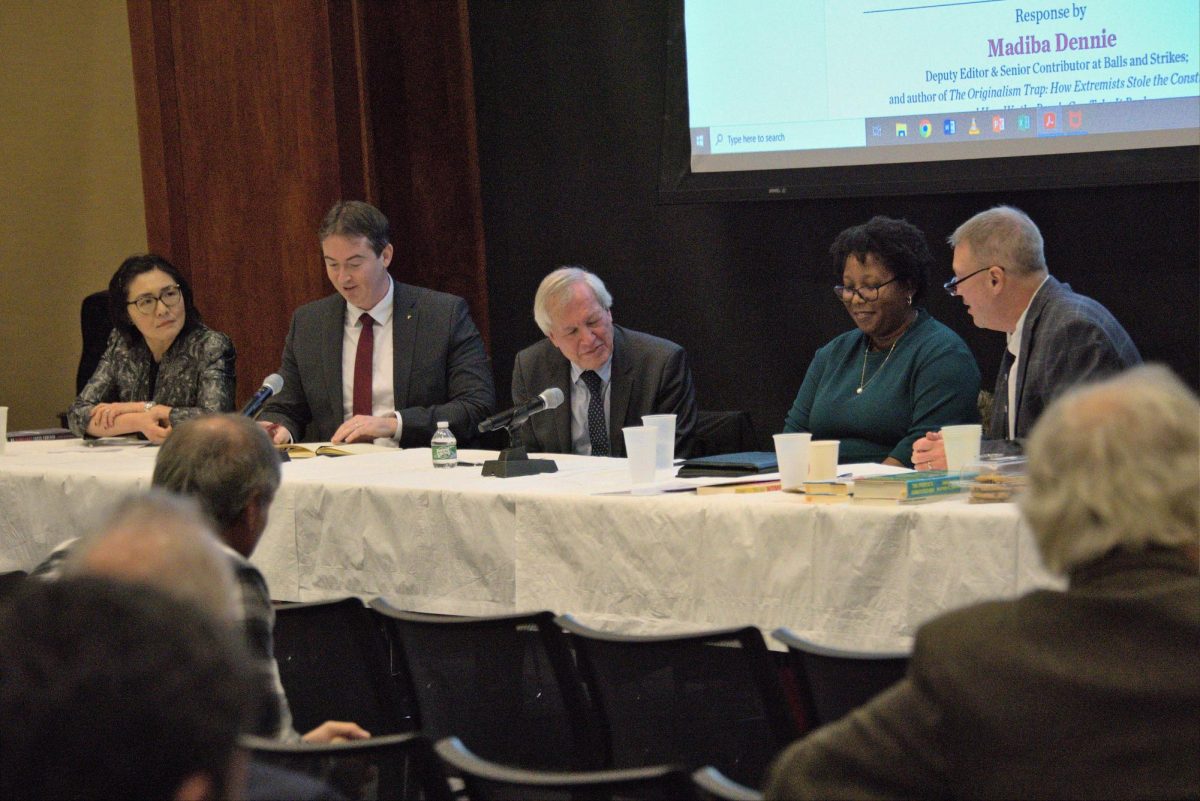Legal scholars and Fordham professors discussed how flaws within the structure of the Constitution obstruct democratic processes at a panel event hosted by the School of Law and the School of Arts and Sciences on Nov. 21.
Erwin Chemerinsky, dean of University of California, Berkeley School of Law, and Madiba Dennie, deputy editor and senior contributor at the Balls and Strikes newspaper, reflected on Chemerinsky’s book, “No Democracy Lasts Forever,” and proposed solutions to challenges facing democracy.
Panelists Julie Suk, Fordham law professor; Robert Hume, interim dean of Arts and Sciences, and chair of the political science department; and John Davenstory, philosophy professor; served as interlocutors.
“The premise of my book and my talk today is that I’m very fearful for the future of American democracy,” Chemerinsky said.
“The crisis of American democracy in large part stems from choices that were made in drafting the Constitution,” Erwin Chemerinsky, Dean of University of California, Berkeley School of Law
Chemerinsky said flaws within the three branches of the federal government have facilitated what he called a crisis of democracy.
“The crisis of American democracy in large part stems from choices that were made in drafting the Constitution,” Chemerinsky said.
Chemerinsky expressed concern that many Americans appear to have lost faith in their government. Chemerinsky cited a Pew Research Center poll from October 2023 that found 19% of Americans expressed confidence in the government, down from 77% in 1964.
With increasingly polarized elections, Chemerinsky said the electoral college is deleterious to democratic values.
“I think it was a terrible mistake in 1787 and remains one today that the president is chosen not by the people, not by popular vote, but by the electoral college,” Chemerinsky said.
Chemerinsky cited a Pew Research Center poll from October 2023 that found 19% of Americans expressed confidence in the government, down from 77% in 1964.
Chemerinsky said the electoral college was less problematic in the 20th century because every president-elect won the popular vote. However, two winning presidential candidates lost the popular vote in this century, in 2000 and 2016.
Chemerinsky said abolishing “winner take all,” the policy of apportioning all of a state’s electors to the candidate who wins a majority of the popular vote in that state (practiced in all states except Maine and Nebraska), would ameliorate the negative effects of the electoral college.
This policy is not grounded in a constitutional provision and could be eradicated via Congress or state legislature.
“No state wants to engage in unilateral disarmament … But I believe that Congress has the authority by statute to eliminate winner take all,” Chemerinsky said.
Chemerinsky said flaws within the three branches of the federal government have facilitated what he called a crisis of democracy.
Chemerinsky and Dennie agreed that partisan gerrymandering is another major issue compromising elections. Gerrymandering occurs when the political party in control of a legislature draws state electoral districts to maximize their party’s advantage.
“It’s become commonplace for partisans to use computer simulations to create breathtakingly precise gerrymanders that dilute the value of a person’s vote,” Dennie said.
Dennie said the unlimited expenditure of billionaires into funding elections further suppresses majoritarian democracy. Elon Musk alone donated a quarter of a billion dollars to the Trump campaign according to campaign finance reports.
“So it has become typical for billionaires to pour their wealth into campaigns to skew the political process,” Dennie said.
As for the Supreme Court, the panelists, alongside 75% of Americans, support term limits for justices, according to a poll released by the University of Pennsylvania. Dennie said that the Supreme Court had lost its credibility after a series of highly controversial decisions and ethics scandals.
Dennie said that the court should be limited in its power to reinterpret laws to protect civil rights from the court’s conservative supermajority.
Dennie said that the Supreme Court had lost its credibility after a series of highly controversial decisions and ethics scandals.
“But when it comes to the Supreme Court, I think it’s actually the reckless abandonment of the Constitution that has been so dangerous,” Dennie said. “I think about overturning much of the Voting Rights Act without any regard for the 15th amendment’s protection, saying that a person’s right to vote should not be discriminated against on the basis of race.”
As a solution, Dennie suggested that the court could be expanded to balance power between conservative and liberal factions without requiring a constitutional amendment.
“The size of the court has changed several times in its history, and also I think is just the most urgent step of Supreme Court reform that’s needed to stop the bleeding before we can do anything else,” Dennie said.
Chemerinsky said that equal representation of states in the Senate is to the detriment of majoritarian democracy. This is one of two constitutional provisions that cannot be amended (due to Article V of the Constitution).
“In the last session of Congress, there were 50 Democratic senators and 50 Republican senators, but the 50 Democratic senators represented 42 million more people than the 50 Republican senators,” Chemerinsky said.
“But when it comes to the Supreme Court, I think it’s actually the reckless abandonment of the Constitution that has been so dangerous,” Madiba Dennie, Deputy Editor and Senior Correspondent at the Balls and Strikes Newspaper
As such, even though Republicans will hold a majority of seats in the upcoming Senate, Democratic senators will represent significantly more people. The urban/rural divide in partisanship has grown over the last two years, with higher concentrations of Democrats in cities and Republicans in rural areas, according to the Pew Research Center. This imbalance can skew political power because congressional representation gives bias to rural areas.
Chemerinsky also said Senate filibustering (when senators intentionally prolong debate to delay or prevent a decision) obstructs democracy.
“The practical reality of this (filibuster) is it does take 60 votes to adopt anything in the Senate other than budget reconciliation legislation or the confirmation of federal judges, Supreme Court justices and cabinet officials,” Chemerinsky said.
He suggested filibuster reform to decrease its ability to impede government action.
“One of the proposals is simply to go back to the old talking filibuster where a Senator has to hold the floor,” Chemerinsky said.
Panelists even discussed the possibility of writing a new constitution.
“I would say for many of the reasons given in the earlier chapters and in the talk this evening, it’s long past time for a new constitution,” Suk said. “But the real question is, is there actually a viable path whether within our lifetimes or even generations past to get one?”
Dennie reflected on the dangers of major constitutional reform, with the potential for detrimental changes or even a secession crisis.
“I think that when you have a constitutional convention, you don’t actually have any idea of what is going to happen in there,” Dennie said.
Dennie and Chemerinsky said that they do not consider constitutional amendments to be out of the question, despite the challenges in passing them.
“I think that it always comes down to the public’s interpretation of the law, how people mobilize and what they will accept as to what the law means,” Dennie said. “It is not necessarily up to the court and not necessarily up to Congress. It is up to the public. And so the fate of democracy rests in the public’s hands.”
Hume seemed to have the most optimistic outlook.
“I just hope that in thinking about the ways in which our constitutional system may have empowered anti-democratic and perhaps authoritarian processes, we don’t lose sight of how power majoritarianism also has the potential to enhance our democracy and how it’s a matter of striking the right balance,” Hume said.
Chemerinsky said he concluded his book stating he hopes he is wrong.
“Very famously, Benjamin Franklin at the end of the Constitutional convention said, ‘A republic, if you can keep it,’ and my question to all of us is can we keep it?” Chemerinsky said.


